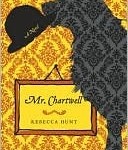by Alli Carlisle
Mr. Chartwell, the first novel by young British writer Rebecca Hunt, centers on an intriguing device: the manifestation of a psychological mode—depression—as a main character. The story follows Winston Churchill in the days leading up to his retirement in 1964, and weaves in the story of Esther, a young widow working in the library of the House of Commons. The real Winston Churchill called his depression “the black dog”; Hunt, in fictionalizing Churchill’s retirement, creates a character called Black Pat (at first called Mr. Chartwell, hence the novel’s title), an enormous black dog whose job it is to depress Churchill. The dog, called Black Pat, rents a room from Esther, which provides the initial connection between the characters.
The character of Black Pat is delightfully written. He goes about his job—of depressing people—by lying on them, or chewing rocks loudly, or tearing apart their household items like any unruly dog does. In his professional role, Black Pat is knowing and sinister. He reaches around Esther’s and Churchill’s defensive misdirection the way depression does with the mind, easily seeing through the weak, hopeful attempts at fighting it off. He sets up slow, elaborate traps, making deals with Esther that allay her anxiety at his presence, that make him look harmless, that allow her to feel some affection for him. He approaches her with eerie, semi-romantic behaviors (I had a wild moment of wondering, early on in reading, whether this might turn into an extremely strange adaptation of Beauty and the Beast, but no, Black Pat is not a candidate for redemption, and this is sadly not the story of a great inter-species love affair—perhaps Hunt’s follow-up novel?).
And yet there are other layers of the character, seemingly unrelated to his outlined role as a depressor: his doggish silliness, his affinity for the absurd (and occasionally the decayed), his love of entangling Esther with wordplay and misquoted aphorisms. In one scene, Esther describes her ambivalent feelings toward a lunch invitation, and Black Pat responds with frustrating obfuscation:
Esther’s legs stretched out under the desk, the sock going with them. She put a hand on her stomach and rubbed it. “It’s hard to describe, I feel like I’m being cornered, like I’m—”
“Like you’re lying in a crate full of meat?” This was delicious to Black Pat, the ultimate happiness.
“That’s really repulsive,” said Esther. The lying analogy was useful though. Yes, it was a feeling of being laid down and waiting, of being held down. “I do feel like I’m lying—”
“We’re all lying in the gutter.” Black Pat’s snout bashed the chair as he snatched it out, quick to interrupt. “But, as the line goes, some of us have our heads in the road.”
“That isn’t the line. It goes, ‘but some of us are looking—”
“But some of us are looking at all the other idiots in the gutter, making plans…”
Esther scoffed at how infuriating he was. “‘But some of us are looking at the stars.’”
Black Pat misheard intentionally. “Yes, some of us are looking at the cars, at all those cars. And wanting to lie in the comfortable cars.”
Esther rolled her head in a way that said, I give up. She said it. “I give up.”
Black Pat is both a complexly developed idea and, yes, a dog. This is a large part of what gives Mr. Chartwell its charm. The novel is nothing if not charming. Even the metaphors are playful, sometimes to the point of intrusiveness (“Light made a pair of tennis shorts over the bedroom wall.”) And yet Hunt is balancing gravity and levity quite delicately, giving the former its moment and relieving the reader of too great a sense of heaviness with gratifying timing. The ticklish language and lightly sketched characters and dialogue may at first overshadow the substantial darkness of the subject matter, making it look like too lighthearted a treatment. But Hunt’s portrait of Black Pat as a companionable presence ultimately shapes the novel into a sympathetic and subtle approach to the struggle with depression, as well as a suggestion of the surprising potential in that struggle for forming alliances.
This post may contain affiliate links.









